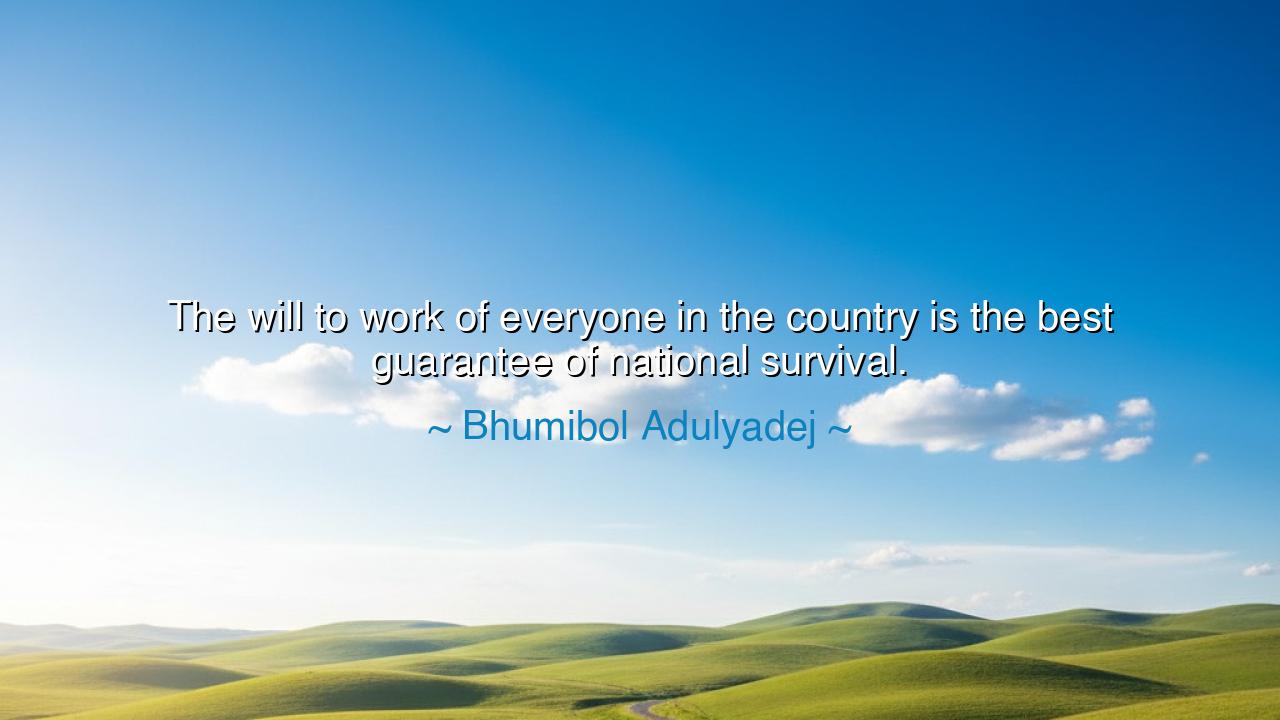
The will to work of everyone in the country is the best
The will to work of everyone in the country is the best guarantee of national survival.






Hear the words of Bhumibol Adulyadej, beloved king and wise shepherd of his people: “The will to work of everyone in the country is the best guarantee of national survival.” In this teaching shines the eternal truth that no nation endures by chance or fortune alone, but by the will to work—the shared determination of its people to rise each day, labor with strength, and build together a foundation that cannot be shaken.
The country is not merely soil, flag, or boundary, but the living sum of its citizens. If their spirit grows idle, if they abandon effort, then even the richest land will decay. But when all put their hands to the task—farmer and teacher, craftsman and leader alike—the nation becomes as a fortress, unassailable not by stone walls, but by the unity of industrious hearts.
Bhumibol spoke these words in the soil of Thailand, but the truth is universal. He saw that survival in times of trial—whether famine, war, or turmoil—does not come from treasures stored or weapons forged, but from the people’s will to work, their resilience and devotion. For where the people stand strong together, no calamity can uproot them; where they falter, even prosperity crumbles to dust.
This is more than survival of the body—it is survival of spirit. Work done with will is not drudgery but devotion, an offering to the land, to one another, to generations yet unborn. Through such labor, dignity is preserved, pride is nurtured, and hope is handed down like a torch that never fades.
Thus let it be remembered: a nation’s survival does not rest upon the wealth of kings or the strength of armies alone, but upon the steadfast will of its people to labor faithfully. Where work is honored and shared, the nation lives; where it is neglected, the nation dies. This is the wisdom of Bhumibol, a legacy for his people, and a law for all nations who would endure.






MM24. Le Tran Mo Mong
While Bhumibol Adulyadej’s quote emphasizes the importance of work ethic, it also raises questions about equality and opportunity. Is the will to work equally distributed among all citizens, or do some face greater barriers than others? How can a nation ensure that everyone has the opportunity and support to contribute meaningfully? Can national survival truly be guaranteed if only a subset of the population is able to work at their full potential?
HMnguyen hoang minh
This quote makes me think about how nations often place value on work as a symbol of strength, but does it also imply that a nation’s survival is purely dependent on the labor of its people? Could it be that a more holistic approach—focusing on both individual work and social well-being—would better serve a nation's survival? Can the will to work be the only thing that guarantees national success?
LTThuy Le Thi
Bhumibol Adulyadej's words resonate in times of national crisis, but how sustainable is it to rely solely on the will to work? Can a nation truly thrive if its people are working hard without strategic direction or innovation? Hard work is important, but shouldn't it be combined with education, creativity, and collaboration to ensure long-term survival and prosperity? What happens if the will to work is not accompanied by the right support structures?
MTMinh Thu
This quote seems to suggest that the survival of a nation is directly linked to the work ethic of its citizens. But does this mean that people working tirelessly, often in difficult conditions, is the key to a nation's prosperity? What about the importance of rest, mental health, and balance in the workforce? Can overwork be detrimental, both to individuals and to the country as a whole?
TNLe Tuan Nghia
Bhumibol Adulyadej’s quote highlights the importance of collective effort for the survival of a nation. But how do we measure the 'will to work'? Is it the effort of each individual, or is it about how well society channels its collective energy? Can a country survive on hard work alone, or do other factors like social welfare, governance, and innovation play an equally important role in national survival?